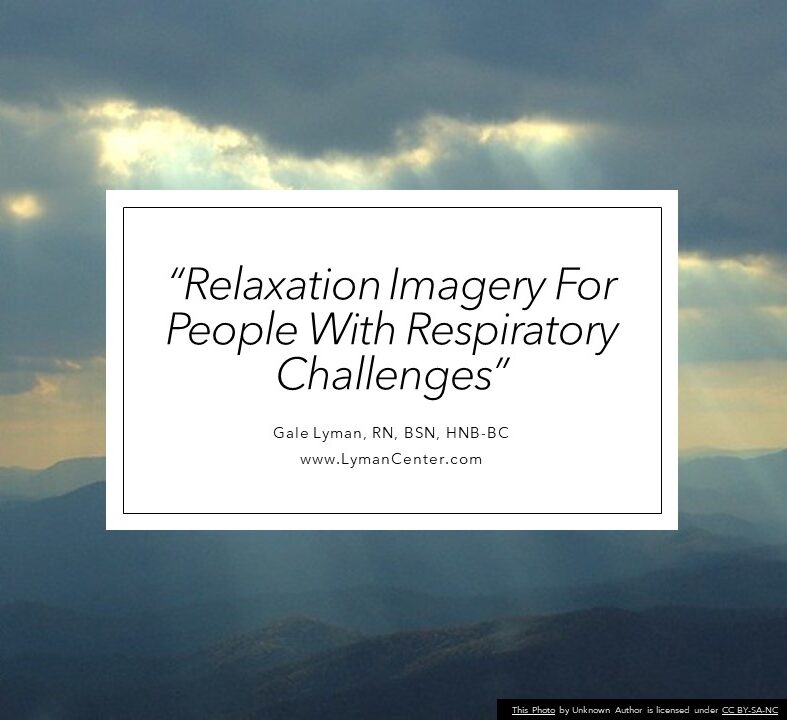Adapting relaxation guided meditation for people with respiratory challenges
“The lungs are a major target of COVID-19” according to the American Lung Association Covid 19 FAQs, and everything you hear from the media. There is so much stress related to the coronavirus Covid 19 pandemic. But suggesting someone with respiratory challenges take a deep breath is downright cruel!
And yet, often guided meditations suggest taking deep breaths to promote relaxation. Others use following the breath as a vehicle for awareness, mindfulness, and relaxation. Some rather old-fashioned meditations are even very directive about how to breath. If someone is having breathing problems, attending to their breath is certainly not relaxing!
Respiratory challenges may include influenza, including the coronavirus Covid 19. Difficulty taking breaths may occur with bronchitis, pneumonia, asthma, emphysema, sinusitis, or even a bad cold. I have asthma, and suggesting I take a deep breath when in the midst of an asthma attack is going to earn you an angry lecture when I can speak again. Simply said, if I could I would. My suggestions about using guided meditation with people having respiratory challenges draws upon my own experience as a woman with asthma, my experience leading breathe with ease groups with outpatients with respiratory diagnoses, and my years of experience leading meditation with long term care residents. In this blog I’ll include some current respiratory resources pertinent to Covid 19.
When offering guided meditations to someone who cannot breathe comfortably, avoid asking them to breathe according to your direction. They are probably breathing the best they can. Instead, you might invite them to breathe in whatever way is most comfortable for them. But it’s possible that breathing isn’t comfortable at all. Your relaxing meditation will probably be more effective if you avoid any reference to breathing if your listener is having breathing difficulties.
“Using the breath is a common vehicle for relaxation guided meditations, but alternatives exist.”
Gale Lyman
One option is imagery of ocean waves flowing in and out. Imagery of flowing rivers and waterfalls are additional options. However, I recommend using imagery of the ocean, the beach, lakes, and really any source of water only after asking your listener if they find those settings enjoyable. Otherwise bad memories of horrible vacations, the worst summer job ever, or accidents at the shore may surface. Some might say that an opportunity to release those feelings is healing but consider if the listener’s immediate goal will be served, and if your expertise and the setting of care is ideal for such trauma work. Not everyone is comforted by the ocean. Another option is healing light or color, allowing the listener to choose the color they prefer. I’m sure there are many options, and I hope you will all add your suggestions to the comments.
Be well. Be at peace. Help each other.
In peace, Gale
Key points, when guiding meditation with listener has respiratory challenges:
- Do not suggest they take a deep breath
- Avoid asking them to breathe according to your direction
- Instead, you might invite them to breathe comfortably
- Better yet, with someone having breathing difficulties, avoid any reference to breathing
Respiratory illness resources
Video training for pursed lip and belly breathing from Am. Lung Association: https://www.lung.org/lung-health-diseases/wellness/breathing-exercises
CDC guidance for people with asthma https://www.cdc.gov/coronavirus/2019-ncov/need-extra-precautions/asthma.html
Weekly webinars by American Lung Assoc. CMO Dr. Albert Rizzo, updates and recommendations for people with lung disease and their caregivers https://www.lung.org/lung-health-diseases/lung-disease-lookup/covid-19/webinars
Credible resources for family care of someone with Covid 19

CDC: Caring for someone who is ill. https://www.cdc.gov/coronavirus/2019-ncov/if-you-are-sick/care-for-someone.html
Mayo Clinic: Diagnoses and treatment including home care https://www.mayoclinic.org/diseases-conditions/coronavirus/diagnosis-treatment/drc-20479976
